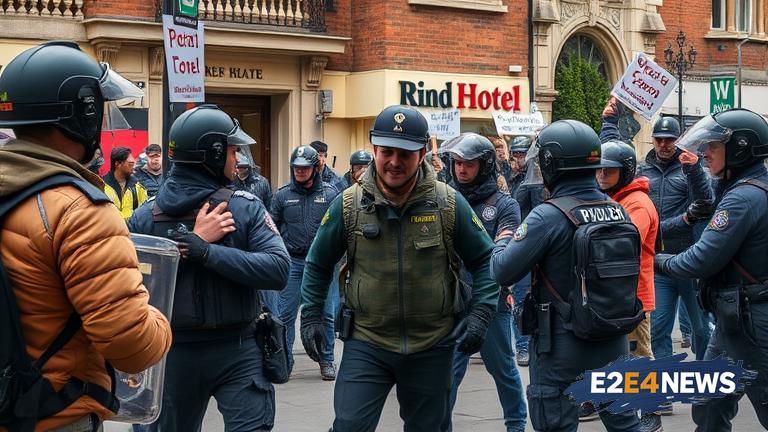A protest outside a migrant hotel in Epping, UK, took a violent turn, resulting in a man being charged with violent disorder. The incident occurred as a group of demonstrators gathered to express their opposition to the hotel being used to house migrants. The situation escalated, with reports of clashes between protesters and police. The man, who has not been named, appeared in court to deny the charges brought against him. The prosecution alleges that he engaged in violent behavior, contributing to the disorderly conduct of the protest. The defendant’s lawyer argued that the evidence against him is insufficient and that he is innocent until proven guilty. The court heard that the protest was organized by a group opposed to the government’s migration policies. The hotel in question has been at the center of controversy, with local residents expressing concerns about the impact of housing migrants in the area. The government has faced criticism for its handling of the migrant crisis, with many arguing that the current policies are inadequate and inhumane. The protest in Epping is just one example of the growing tensions surrounding the issue. As the trial continues, the court will hear from witnesses and review evidence to determine the defendant’s guilt or innocence. The case has sparked a wider debate about the right to protest and the limits of free speech. The UK has a long history of peaceful protest, but recent events have raised concerns about the potential for violence and disorder. The government has pledged to review its migration policies and address the concerns of local communities. However, critics argue that more needs to be done to address the root causes of the crisis. The situation in Epping is a microcosm of the larger issues facing the UK, with many calling for a more compassionate and effective approach to migration. The protest and subsequent trial have highlighted the need for calm and respectful dialogue, even in the face of disagreement. The court’s decision will be closely watched, as it will set a precedent for future cases involving protest and disorderly conduct. The defendant’s fate remains uncertain, as the trial continues to unfold. The people of Epping and beyond will be watching with interest, as the case raises important questions about the balance between free speech and public order. The UK’s migration policies remain a contentious issue, with no easy solutions in sight. As the country grapples with the challenges of migration, it is essential that all parties engage in constructive and respectful dialogue. The events in Epping serve as a reminder of the need for empathy and understanding in addressing the complex issues surrounding migration. The trial will continue, with the court’s decision expected in the coming weeks. The outcome will have significant implications for the defendant, the community, and the wider debate about migration and protest in the UK.
